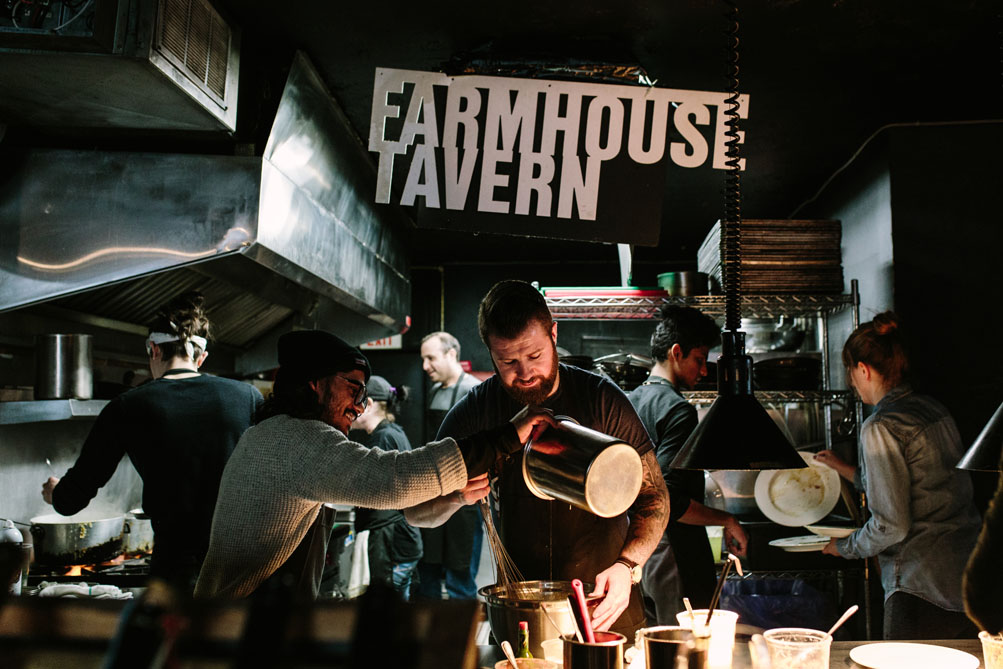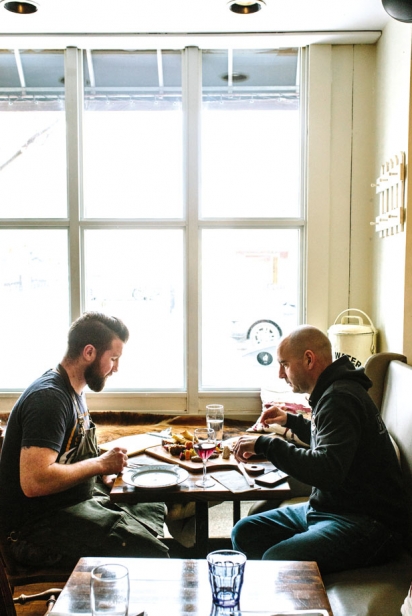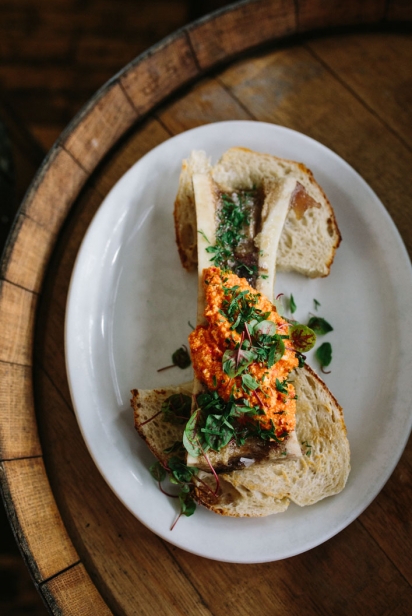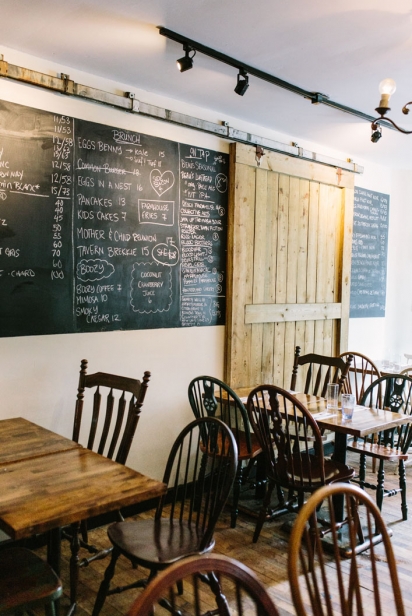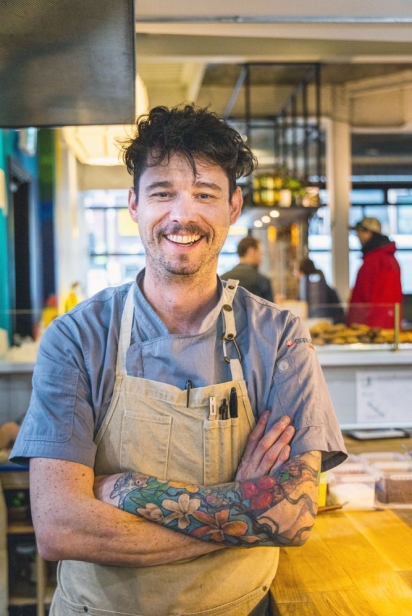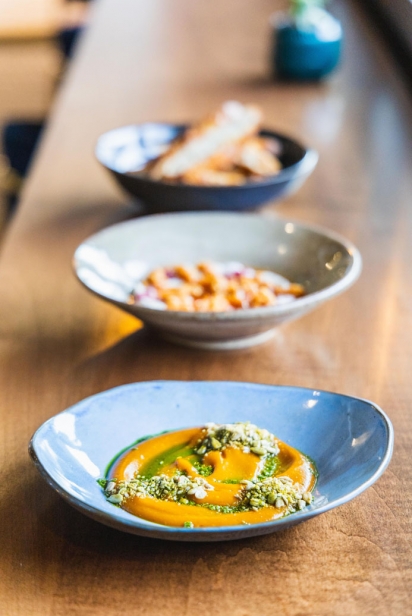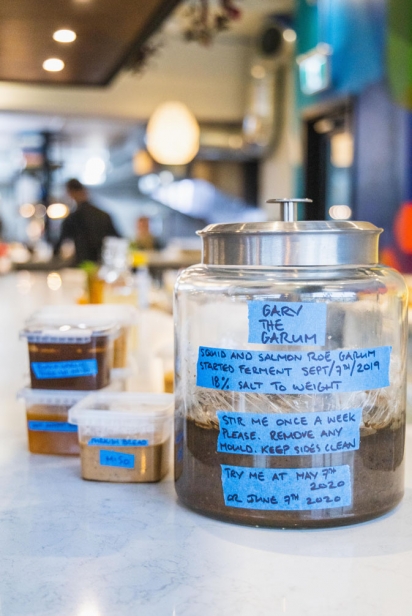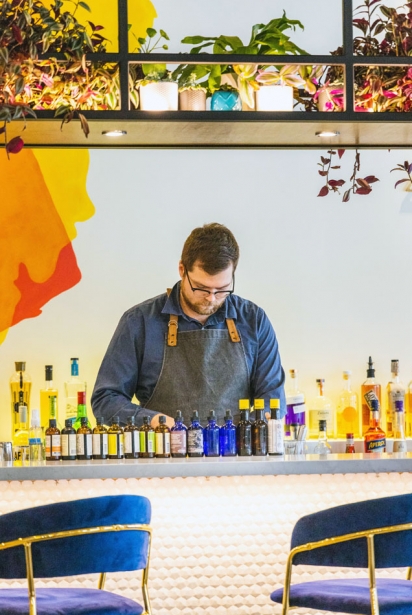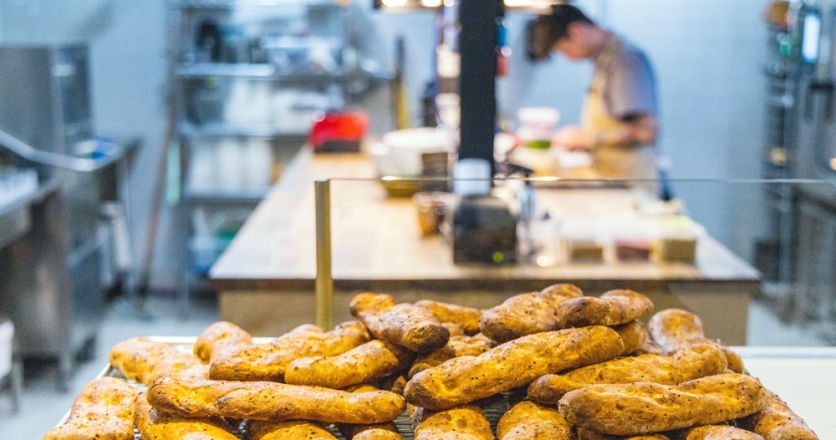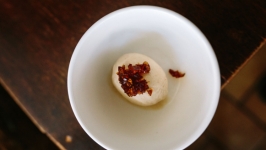F*ck Food Waste (and Mondays)
When Darcy MacDonell set out to achieve work-life balance eight years ago, he didn't realize the brass ring he pursued came with another significant problem. The owner of Farmhouse Tavern in Toronto's Junction area traded his job managing large restaurant and hotel dining rooms seven days a week to work four days as the proprietor of a cozy neighbourhood joint. But shuttering his new venture three days every week to spend time with family would make avoiding food waste his next professional conundrum.
"If you're not going to have a restaurant open all the time, what do you do with the food?" MacDonell mused. "How do you hold onto food? How do you preserve food when you're closed three days? You don't."
Freshness was essential to the farm-driven dishes advertised on Farmhouse Tavern's weekly chalkboard menus, so MacDonell decided the solution was to sell off every dish before closing on Sunday night. Staff would make it an event. They'd call it F*CK Mondays and feature a different drink or plate at a discounted price until the fridge was bare.
F*CK Mondays would kick off right after Sunday brunch with half-price mimosas to use up orange juice and bubbly that wouldn't keep until the restaurant re-opened on Thursday.
Then every hour afterward, something else would be reduced to clear. Appetizers would fall to half price at 7 p.m. Entrées would follow soon after. If the kitchen ran out of meat for the week's duck and mushroom pasta, well, they'd just cook up mushroom pasta at a new price point until that got used up, too.
"I don't want to be throwing stuff out. I hate freezing stuff and re-using stuff," MacDonell says. "Any chef worth their weight in salt is excited to use fresh produce that comes in every week. No one's excited about going to the freezer to get something out."
Diners were happy to help MacDonell in his quest to avoid food waste at the end of his work week. Some showed up at 3 p.m. to whittle away the evening eating the specials as they came online every hour. Others arrived in groups to share plates of appetizers washed down with VQA wine poured at half price later in the day.
The scant leftovers at the end of the night were pickled or smoked to extend their shelf life for repurposing another day, or they would be sent home with staff.
Eight years in, MacDonell's goal of work-life balance hasn't been thwarted by food waste, but is still a jaw-dropping problem that plagues Canada's entire dining industry.
A 2019 report from the federal Environment and Natural Resources ministry found restaurants waste 21 percent of all dairy, eggs and field crops; 38 percent of produce; and 20 percent of meat they purchase for use. The main reasons: kitchens prepare more food than they serve, they're ordering too much inventory, or they're not storing it properly. Diners are also to blame for sending uneaten food back to the kitchen rather than taking it home at the end of the meal, the report says.
Those stats aren't top of mind for everyone who comes to Farmhouse Tavern for F*CK Mondays. Still, they appreciate MacDonell's MO for the kitchen clear-out with the cheeky name once they learn the back story.
"It's probably because they can eat really well, cheaply, in a fun setting," MacDonell says about the draw of F*CK Mondays.
"Then they find out why… The very first thing we say is, 'We're closed. We're not coming back until Thursday night. We don't want to throw anything out.' People say, 'Oh, that's cool,' and 99 percent of the time, they say 'Ah, that's a great thing.'"
Dispatching food waste
Down the QEW in St. Catharines, chef Adam Hynam-Smith and his business partner-wife Tamara Jensen made food waste a pillar of their business plan when they opened Dispatch in the city's downtown last year.
The kitchen at the restaurant that enRoute magazine ranked as one of Canada's best subscribes to a closed-loop approach to using ingredients until there's nothing left. That means incorporating an item three or four different ways in the same dish or using an ingredient in various forms across both the food and drink menus.
Take lemons, for example. Dispatch will rescue the peels from a local lemonade business and make Oleo Saccharum for cocktails, squeeze out any excess juice for pickles, or dehydrate and powder the rinds for teas, dukkah, curd or butter.
The team has made pumpkin a zero-waste dish by serving it as confit with three-day-old Turkish bread crumble, pumpkin skin pasta, celery leaf slaw, Ras el hanout and pumpkin gut milk.
Fermentation is also standard practice at Dispatch. Most recently, the kitchen moved to a tasting menu format, limiting à la carte orders for bar seats only so that staff could better plan quantities of ingredients needed each day.
It takes a lot of experimentation — and not everything works out, Hynam-Smith admits. The fact they're even trying makes them better cooks, if only for the creativity it inspires and the constructive criticism born of the duds.
The approach counters everything Hynam-Smith learned in the professional kitchens that weaned him. "You're taught as a young cook that no one dish can feature the same ingredient [more than once], but what if you're able to take one ingredient and make other uses out of it, and use it in other dishes?" he says.
Or not use it at all, regardless of culinary conventions. "As you get older, you look back over your career at the kitchens you worked in. You did what you were told. 'This is what goes into stock; this is what goes into the sauce.' You look back and say, 'Why is this going in there?' It doesn't necessarily serve a purpose and doesn't have to be in there," Hynam-Smith says.
Efforts to limit waste at Dispatch go beyond food. Cutlery rests are provided to diners to use the same fork and knife throughout a meal instead of replacing them with every course. All cork goes to a nearby shop with contacts that upcycle them into yoga mats and shoes.
"We're even trying to figure out what to do with the broken glass and plates we go through," says Michael Kapusty, who manages Dispatch.
Cutting waste — food or otherwise — isn't about more than unlearning industry standards. However, Hynam-Smith notes, it also requires the diner to frame the restaurant experience differently.
"We need to take the approach of less is more with the diner," he says. "You only need to eat 80 percent of what you think you need to eat, and you're full. If people come in and aren't eating everything, you're serving too much and that goes into the bin as waste."
Not everyone is coming here for Dispatch's enterprising — and delicious — ways of curtailing food waste. Some just want to eat at one of the country's best new restaurants. But "when we take the time to explain the processes, people love it and gravitate toward it," Jensen says.
Zero waste is catching on
Restaurants elsewhere are tuning into the issue of food waste and the need for solutions, too. After all, they're responsible for 3.11 million tonnes — nine percent — of total food waste in Canada, according to The Avoidable Crisis of Food Waste: The Roadmap, a report released last year by Second Harvest Food Rescue and Value Chain Management International.
Some restaurateurs have reached out to MacDonell for permission to borrow the F*CK Mondays format for the sake of lowering that number.
"Of course you can," he says. "The reality is most places are open more often than us, so there might not be a need. I think people should definitely pursue (a food-waste strategy). That's for every business owner to figure out how they want to do things."
Not every business owner cares enough to do anything, however, noted James Rilett, Restaurant Canada's vice-president, Central Canada. "But the number of consumers who do is growing, and it's a smart operator that goes after that market," he says.
To help, Restaurants Canada, which represents the food-service industry nationally, offers its members webinars on reducing food waste and promotes organizations such as Second Harvest, that redirect excess food from commercial kitchens to schools and social organizations.
It also put the issue in the spotlight at its annual trade show in 2019 with demonstrations on using lesser cuts of meat or traditionally unused parts of vegetables.
The ideas are novel for some, but curbing food waste, especially by ordering less, is really about pragmatism in a business with profit margins as thin as restaurants.
"I don't think sustainability will be No. 1; the way cutting costs is," Rilett says. "People know their bottom line best, and they're always looking at ways to change how they do things. If you can lower food costs, that can make the difference."
Despite F*CK Mondays being a staple since Farmhouse opened in 2012, MacDonell's efforts really only turned heads last summer when American media outlet NPR wrote about them.
All the attention spurred MacDonell to tweak F*CK Mondays so that everything on the menu is half-price starting at 3 p.m. Sunday — a move that's made them even more tempting and effective in their mandate of keeping food out of the trash bin.
"It's ironic that an American-based piece on NPR got us attention, but also a sign of the times that public is more aware of it and more thoughtful about it," MacDonell says. "It's much more accepted by the public to combat food waste."
FarmHouse Tavern
1627 Dupont St., Toronto, Ont.
farmhousehospitality.tumblr.com | 416.561.9114 | @farmhousetavern
Dispatch
386 St. Paul St., St. Catharines, Ont.
dispatchrestaurant.com | 289.273.2393 | @dispatchresto


